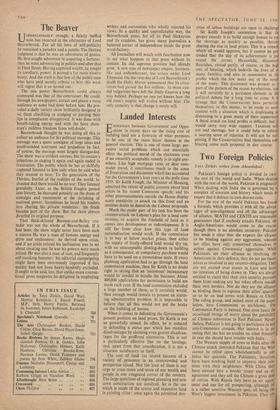Landed Interests
XCHANGES between Government and Oppo- sition in recent days on the rising cost of building land are a foretaste of what promises to be one of the more bitter themes at the general election. This is one of those large, per- vasive social problems which can materially affect the political mood of the electorate even if no smoothly acceptable remedy is in sight any- where. Like high mortgage rates, or dear com- muter travel, it contributes much to the sense of frustration and discontent which has accounted for the Government's lean years at the polls since 1959. Sir Keith Joseph, the Minister of Housing, admitted the extent of public concern about land prices in his recent Commons speech; and his other pronouncements outside the House display acute sensitivity to attack on this front and an anxious desire to demolish the Labour proposals.
Much the easier part of his task has been the counter-attack on Labour's plan for a land com- mission, to acquire the freehold of land as it comes into development or redevelopment. It is still far from clear how this type of land nationalisation would work. If the commission is to buy at below market prices, then either the supply of freely-offered land would 'dry up, with an unacceptable slowing-down in building as a consequence, or compulsory purchase would have to be used on a tremendous scale. If every planning application had to go through the land commission machine, then Sir Keith is no doubt right in saying that an `enormous' bureaucracy would be needed to handle the business. About 400,000 applications for permission to build are made each year. If the land commission excluded a large number .of these, as it certainly would, then enough would remain to present an alarm- ing administrative problem. It is impossible to believe that all this would not put the brake on the building of houses.
When it comes to defending the Government's present position on land prices, Sir Keith is not so powerfully armed. In effect, he is reduced to defending a status quo which has manifest disadvantages by claiming even greater disadvan- tages for the proffered alternative. This is not a particularly effective line on the hustings; and, apart from that consideration, it is not a situation satisfactory in itself.
The cost of land :tas soared because of a variety of pressures in an overcrowded and prosperous island. Not the least of them is our urge to cram more and more of our wealth and people in one congested corner of the country. The large questions of regional planning and new town construction are involved. So is the use which is made of the scarce and expensive land in existing cities: once again the permitted den- sities of urban buildings are open to challeng
Sir Keith Joseph's contention is that th proper remedy is to build enough houses to en' the shortage as quickly as possible, thereb abating the rise in land prices. This is a remed which all would approve, but it cannot be pr tended that the day of its achievement is jus round the corner. Meanwhile, disconten flourishes, rooted partly, of course, in the hi cost of housing, which bedevils the lives of s many families, and also in resentment at th profits which the few make out of the need of the many. This discontent was present as part of the pattern of the recent by-elections, an it will certainly be a persistent element in th political debate for a long time to come. It strange that the Conservatives have permitted themselves, in this matter, to be made to seen content with a situation which is displeasing o distressing to a great many of their supporters A fiscal attack on land. profits is difficult, but it would carry very wide support. Taxation will not end shortage, but it could help to relieve a souring sense of injustice. It will not be stir' prising if the Conservatives find themselves enr bracing some such proposal in due course.


































 Previous page
Previous page